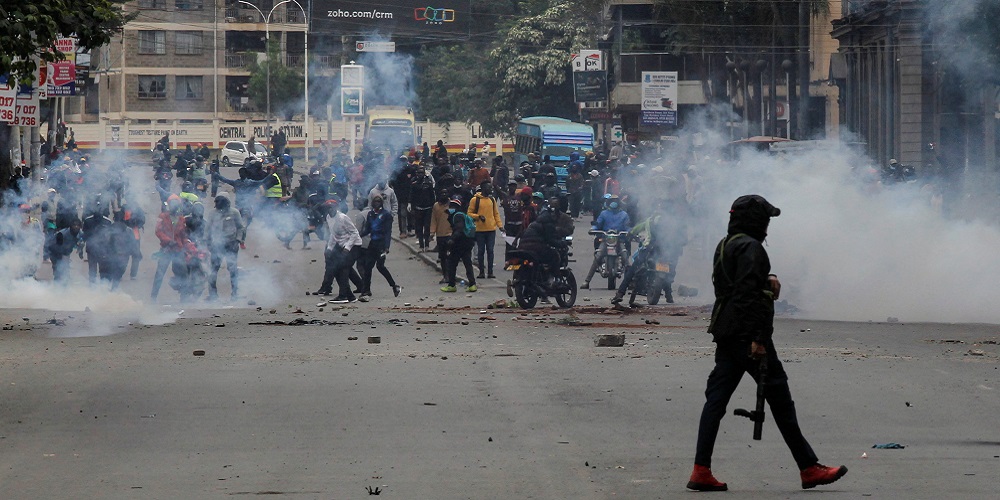News
Kenyans Begin Fresh Nationwide Protest To End Bad Governance

Kenyans in their thousands have stormed major streets across multiple regions in the country to begin a fresh nationwide protest over bad governance in the East African country.
It was learnt that the nationwide demonstration which fully began on Tuesday was an effort to intensify demands for improved governance.
It all started as anti-finance bill demonstrations last month but now escalated into widespread anti-government protests.
Today’s rallying call from protest organisers is “Occupy Everywhere.”
Protest have started in Mombasa, Kisumu, Kisii, Migori, Kitengela, and Makueni, while Nairobi remains relatively calm, although reports and live footage indicate gathering crowds in various parts of the capital.
Ibom Focus reported last week that at least 30 people died in protests in Kenya, triggered by the government’s plan substantially to raise taxes, according to the Human Rights Watch on Saturday.
The demonstrations erupted across the country as citizens expressed their anger over the economic strain caused by the proposed tax increases.
In a statement on Saturday by the associate Africa director at the Human Rights Watch, Otsieno Namwaya, “Kenyan security forces shot directly into crowds of protesters on (Tuesday) June 25, 2024, including protesters who were fleeing.”
“Shooting directly into crowds without justification, including as protesters try to flee, is completely unacceptable under Kenyan and international law,” he said.
Ibom Focus had earlier reported that the protesters gathered yet again in Nairobi as Kenya’s security officials put up roadblocks and fire tear gas and rubber bullets at the demonstrators.
Kenyans are determined to continue the protests despite President William Ruto’s U-turn in signing the finance bill that has sparked outrage in the capital, Nairobi and other parts of Kenya.
The protesters gathered yet again in Nairobi as Kenya’s security officials put up roadblocks and fire tear gas and rubber bullets at the demonstrators.
Deadly protests were sparked weeks ago by the 2024 finance bill as the initially peaceful rallies gathered momentum across the country.
About two weeks ago, Kenya’s Parliament was partly set ablaze and at least 22 people were reported killed across the country.
News
Just in: Shettima jets out to attend Senegal’s independence

Vice President Kashim Shettima has departed Abuja for Dakar, Senegal for official assignment.
The VP is expected to represent President Bola Ahmed Tinubu at the West African nation’s 65th Independence Anniversary celebrations.
Senegal marks its Independence Day on April 4 each year, commemorating its liberation from French colonial rule in 1960.
The annual celebration is a significant event featuring national parades, cultural displays, and ceremonies highlighting the country’s achievements and unity.
A statement issued on Thursday by Senior Special Assistant to the President on Media and Communications, Office of the Vice President, Stanley Nkwocha, said Shettima’s participation followed an official invitation from Senegalese President, Bassirou Diomaye Faye.
This underscored the strong diplomatic and economic ties between Nigeria and Senegal.
The two nations share longstanding relations, particularly within the Economic Community of West African States (ECOWAS), fostering cooperation on regional security, trade, and development initiatives.
The event is expected to reaffirm Senegal’s commitment to democratic governance and regional cooperation.
Vice President Shettima is scheduled to return to Nigeria immediately after the one-day celebrations, continuing his engagements in national development and diplomatic outreach.
News
Just in: “Ignore rumour mongers, there was no time I collapsed “-Wike asserts

Federal Capital Territory FCT minister, Nyesom Wike on Thursday dismissed social media reports that he collapsed last week, describing the reports as the handiwork of rumour mongers trying to score cheap political points.
Wike spoke after he inspected four ongoing projects in the territory, including the International Conference Centre ICC.
News
CJ transfers Natasha’s case to Justice Nyako

The Chief Judge of the Federal High Court, Justice John Tsoho, has reassigned the suit filed by Senator Natasha Akpoti-Uduaghan against Senate President Godswill Akpabio and others to Justice Binta Nyako.
The case, which was initially handled by Justice Obiora Egwuatu, will now be heard afresh by Justice Nyako following Egwuatu’s withdrawal from the matter. His decision came after allegations of bias were reportedly raised by Akpabio, the third defendant in the suit.
Justice Egwuatu withdrew from the case on March 25, citing concerns over judicial integrity.
“Justice is rooted in confidence in the court. Once a litigant expresses his belief that there is bias or likelihood of bias on the part of the judge, it will not be in the interest of justice for the judge to continue,” he stated.
He forwarded the case file to the Chief Judge for reassignment.
Senator Akpoti-Uduaghan, who represents Kogi Central Senatorial District, had filed the lawsuit to halt an investigation into her alleged misconduct by the Senate Committee on Ethics, Privileges, and Public Petitions. She had sought an interim injunction to prevent the committee from proceeding with disciplinary actions against her.
Justice Egwuatu previously issued an order on March 4 declaring Akpoti-Uduaghan’s suspension by the Senate null and void. However, on March 19, he set aside a portion of his ruling after hearing arguments from both sides. The Senate had filed a motion urging the court to vacate the order, arguing that it interfered with its legislative duties and could lead to a constitutional crisis.
During legal proceedings, the Senate’s lawyer, Chikaosolu Ojukwu, argued that the court’s order restrained the Senate from fulfilling its constitutional responsibilities, while Akpoti-Uduaghan’s counsel, Michael Numa, opposed the motion, describing it as a disregard for the court’s authority. He urged the court to dismiss the Senate’s application and take disciplinary action against the defendants for contempt.
Akpoti-Uduaghan also filed a contempt charge, asserting that her suspension was a deliberate violation of the court’s interim injunction. She maintained that the court’s directive was duly served on the defendants, but they proceeded with actions in defiance of the ruling.
Nigeria’s 1999 Constitution (as amended) grants the National Assembly the authority to manage its internal affairs, including disciplining its members. However, this power is not unlimited. It must be exercised in accordance with constitutional provisions, due process, and the rule of law.
The principle of separation of powers, outlined in Section 4 for the legislature, Section 6 for the judiciary, and Section 5 for the executive, ensures that each arm of government functions independently without interference. However, courts have the authority to review legislative actions if they infringe on fundamental rights or violate existing laws.
Judicial rulings have established that while legislatures hold disciplinary authority, their actions must align with the principles of natural justice, particularly the right to a fair hearing, as outlined in Section 36 of the Constitution. The outcome of this case could clarify the extent of legislative immunity and determine whether courts can override Senate disciplinary actions when due process is at stake.
-

 News7 hours ago
News7 hours agoNatasha: Kogi PDP hammers Ododo, reiterates unfeigned support for her
-

 Economy6 hours ago
Economy6 hours agoSEE Black Market Dollar To Naira Exchange Rate Today 3rd April 2025
-

 News14 hours ago
News14 hours agoRivers APC demands Fubara’s probe over ex-HoS allegations
-

 News2 hours ago
News2 hours agoJust in: “Ignore rumour mongers, there was no time I collapsed “-Wike asserts
-

 News5 hours ago
News5 hours agoJust in: INEC dumps recall petition against Sen Natasha
-

 Economy15 hours ago
Economy15 hours agoNaira rebounces against the dollar in parallel market
-

 News7 hours ago
News7 hours agoUS cancels ex- president ,Nobel Peace Prize winner Oscar Arias visa
-

 News10 hours ago
News10 hours agoJust in: Finally, Trump imposes 14% tarriff on Nigeria oil, others





